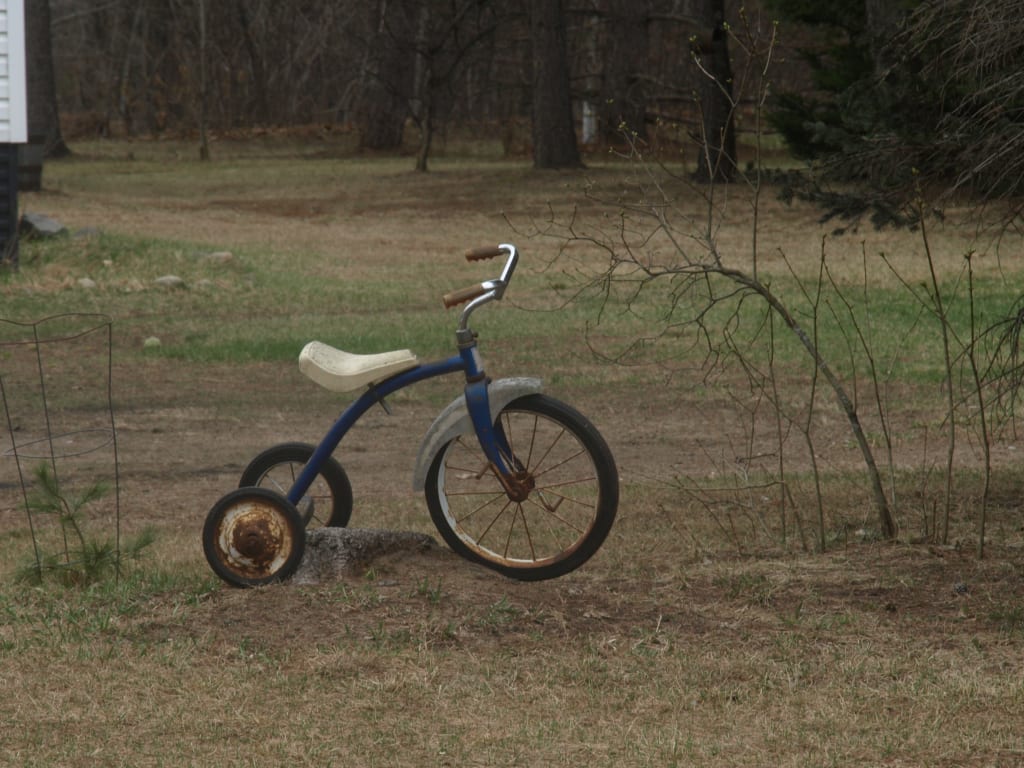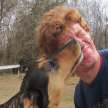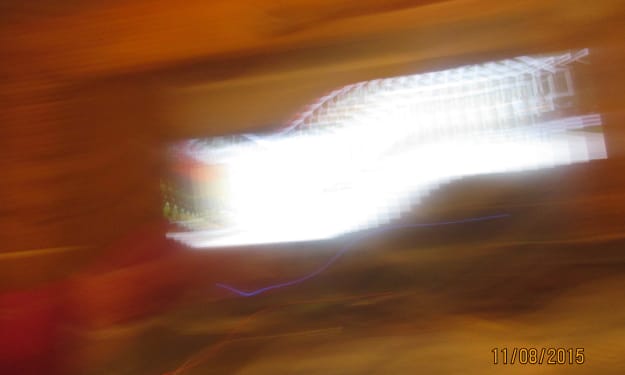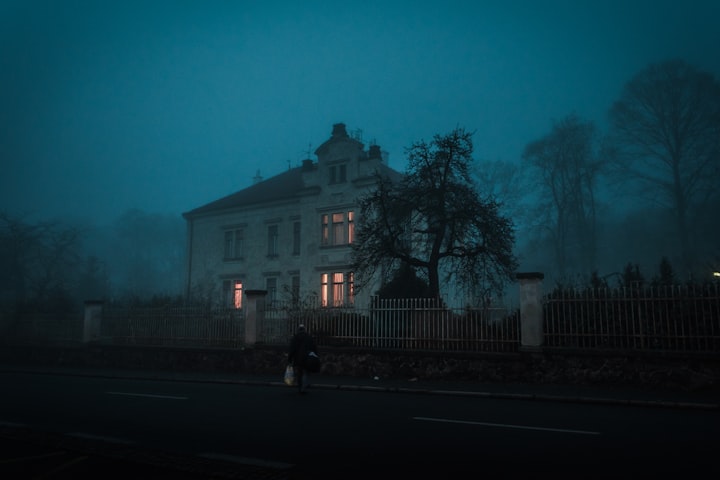Shelter in Place
Society needs solutions. They're never one size fits all.

Is a trumpet blown in a city, and the people are not afraid? Does disaster come to a city unless the Lord has done it?
—Amos 3:6
The day they shut it all down his father came home from work with hatred in his eyes. He threw his work coat on the kitchen table and stood there waiting, perhaps for some greeting from a child. He yelled the first name that came to his inebriated mind but no one answered. When he found the children they were sprawled out on the living room floor watching cartoons on a laptop.
Where’s your mother, he growled.
The boy didn't answer because it meant opening himself up to attack. He was smarter than that, wary of this old game, because there were always games. Being younger and stupider, his sister answered without hesitation.
She's out with Nina right now, she said.
Nina? That fat bitch from the gas station?
That's the one, said the girl.
Why didn't she tell me where she was going?
Cause you would have said she couldn't go.
There's a lockdown right now, said their father. He looked astounded at the gull of it.
When's she's comin back?
She didn't say.
She didn't say?
Nope.
He staggered back into the kitchen. When later on the boy came through on his way to the bathroom the man was hunched over a bowl of leftovers with a soupy and unknown substance drizzling down his chin. He wasn't a tall man but he was wide at the shoulders, barrel-chested, small squinting eyes that bugged when he was drunk. Those little black eyes followed his son from one end of the room to the other. Then the boy closed the bathroom door behind him and stood before the mirror.
When Nina dropped her off in the driveway he was waiting on the stoop and she could see already that he was hammered. She didn't approach him. She stood there with her arms crossed over her chest and her purse clutched in one small fist. She reached and nudged her glasses up her nose. What are you doing, she said.
Waitin for you.
What do you mean waiting for me?
There's a goddamn lockdown, he slurred. Right now. Nobody can leave, can’t go anywhere. What you didn’t hear? You want people to get sick? You want the kids to get sick?
We can still go to the grocery store. To the gas station. I heard about it.
Well that’s not what I heard.
Whatever.
He stood up and teetered. Narrowed his eyes. Something rodentlike in his pinched face, his pouched cheeks.
Get in the house, he said.
I'm going. If you'd get out of the way.
What, I'm in your way?
Yeah, that’s right. You’re in my way.
The man scowled. He pointed accusingly.
What the fuck did you and Linda do, huh? Go to the bar? Bars are closing. For the lockdown. So your boozin is done. You’re not goin anywhere. Not until this is over. Neither are the kids.
I was with Nina. Nee-nah. I don't know a Linda.
On awkward, uncertain legs he stepped down off the stoop and stood aside. He made an exaggerated sweep with his arms and made a drunken pantomime of a bow. She shook her head. Turned swiftly and went around the rear of the house to the back door. He watched her go, tottering and still slightly bowed before the bloodred evening, his shadow spilled slantwise from his heels like some drygulch djinn in waiting.
In the morning the boy found both his mother and father on the sofa, their wide eyes fixed to the TV. It was the news.
Grab some cereal, said his mother without glancing up.
The boy looked at the television. Is it getting worse? he asked.
They both nodded.
He felt his guts contract against his spine. His father looked at him.
Don’t count on seeing your friends this summer, he said.
When the boy turned to his mother, his eyes imploring, she only frowned and shrugged her shoulders.
Sounds bad, she said. It’s the law, baby. We can’t do a thing about it.
The boy sat cross-legged on the floor and watched, too. A nurse from some big city out east was crying, wailing about the deaths, so many dead spilling out of the hospitals like cockroaches from rusty vents, like a plague sent to wipe away all iniquity. Then something very curious happened. As the boy watched this wailing young woman her image began to flicker. The screen itself seemed to glitch, warping at the corners, bowing inward at the center. His heart hammered. He looked at his father. Dumb cow eyes, totally absorbed. His mother did not seem to notice either. She was bent over her purse, digging for her pills.
His father went to work while his mother disappeared into the bathroom for hours. His sister hovered bored over her homework and then locked herself in her room to make videos for her friends on the internet. The boy didn’t have a phone, and most of his friends were not on the internet anyway. You don’t need a stupid phone when you have BB guns and high-fidelity walkie talkies. He went to the bathroom door and knocked.
What do you need baby.
I wanna ride my bike, he said. Can I ride my bike to the park?
God no. The park is probably closed, baby. You gotta stay home. I know it’s hard.
The boy stood there. He thought a moment.
What if I wear one of Dad’s masks?
Absolutely not. Go make funny videos with your sister, okay hun? Mommy’s got work to do.
What are you doing in there?
He heard her feet shuffling on the linoleum.
I’m cleaning the toilet and the sink, she said. A soft clatter as she shut the medicine cabinet.
He sighed and trotted through the trailer to his sister’s room at the very back of the hallway. He stood at the door. Knocked twice.
Go away, she called.
I want to make a video with you, he said.
You can’t, it’s only me. It’s my account.
He was about to protest, to accuse of her something ugly, but his jaws snapped shut. Motion. Something moving at the bottom edge of sight. He looked down. From the crack of sallow light between her door and the carpet it was sliding outward, snaking between his feet like something culled from a basket. It was slimy. Flesh colored, some pale intestinal fluke slinking down the hall. Slowly. Farther and farther, edging and feeling its way out. He stepped back. Watched in equal parts horror and fascination.
When she flung open the door she nearly broke his nose.
He gaped at her. Started to form a word.
Stop spying on me! she snarled.
In the yard he crouched small and bestial. Squatting there among the tatter of dead vines and copper weeds of his mother’s untended flower garden, there to wait out a hundred inevitabilities. He watched small black birds gather on the powerlines. He grew curious: Why didn’t they die? Burst into flame and rain down their tiny platinum feathers? Had anyone noticed but him, this bizarre phenomenon? Where was all that killing voltage? Had they shut off the power to stem the illness, and can it travel through even slighter mediums?
If time passed he only noticed by the silent race of cloud shadows toward a hushed and naked rim of the world. He counted the heartbeats in his temples.
On the second week his father was furloughed.
The children passed like poltergeists by the sofa where their mother sprawled in a perpetual sleep. Sometimes she would roll onto her side and groan, mumble their names to the twilight ether in which she was prisoner. They poured cereal for breakfast and for supper until one Thursday the milk ran out and their father declared he would not be going to the grocery store during such a crisis.
There’s a bunch of canned stuff in the cupboard, he told them.
At midnight when the benzos faded their mother would rise furious at her spouse and they would battle until the gray hours of dawn. The boy, slumped tight into the corner, would rock back on forth on his bare mattress and beat his fists into his forehead until the pain radiated down his neck and spread like a sleeping cap over his skull. When the warring was finally eclipsed by some pharmaceutical lull he lay listening to his kid sister weeping softly in the next room. He had not eaten in two days for fear of disturbing the furloughed brute at the other end of the trailer. Sleep was not sleep at all but the breakdown of waking consciousness, a sinking into darker waves and finally some atomized world without sense or name or knowledge. One morning he blinked himself out this half-sleep state to witness a great black insect skitter from one corner of the ceiling to the other. It was as large as he was and seemed to be some composition of motor oil and shadow. He watched it shoot forward on its many elbows cocked at all wrong angles before slipping into a hole near the doorway. He rose to a sit and studied the hole. Big enough for a child to crawl into. Dark stains around a jagged rim like some blackened leprous mouth.
In the living room his mother was awake. She was lucid, too. Her cellphone was pressed to her ear and she spoke in a hushed tone. He waited for her to finish, standing dumbly in the hall. When she was done she set down the phone and turned to him.
I know you’re not gonna like this, she said, but the neighbors might have it now. I guess Dillon brought it home from daycare. I know it’s gonna be hard, baby, but you can’t play outside anymore, okay? They were just saying the other day on the news that it spreads through the air. It can drift for miles on a windy day.
He stood there and said nothing. His face small and wan and solemn like an unstirred autumn pool. Then he turned around and went back into his room.
*
Lee Hassler winced, bent again despite the pain in his lumbar region. He unscrewed the cap and lifted the dipstick and held it against the sky. Not quite full. He could stand to add another half pint.
He left the cap and dipstick resting on the mower and limped to the garage. There were two more push mowers at the rear of the building, both of them in fine condition, and above him, bungee strapped to the rafters, was the rusted shell of another he’d abandoned years prior. He rummaged through half empty quarts of motor oil and transmission fluid and pushed aside cans of WD-40 and finally found the bottle he wanted on the shelf below.
He was taking a long drink of his favorite pop when he noticed the strange little shape growing at the periphery of his vision. He lowered the can from his mouth. Across the empty lot adjacent to his, running madly, was one of the neighbor kids. He frowned. Raised a hand to shield away the afternoon glare and squinted. It was the boy. Coming in at a full gallop.
What in the hell, Hassler murmured.
And then the boy was hurtling over Abby’s hedges, his arms ghost white and all akimbo, those bony spiderlike legs pumping wildly. From a distance the child appeared to be wearing a white jumpsuit, but suddenly it was clear he was wearing nothing at all but a pair of spiderman underpants. He was screaming something. Hassler stared, trying to compute this awful spectacle. He realized just moments before the boy came bounding by him like some half-time streaker that he was screaming DILLON DILLON DILLON I WANT IT TOO I WANT IT TOO—
By some unknown will Hassler managed to sprint just fast enough to catch the boy at the porch before he barreled through the front door. He gripped the child by his bony shoulders and turned him about to face him. His stomach dropped. The boy was all but emaciated, ribs protruding like tree roots from eroded earth. Great owllike eyes, haunted and empty in their shaded cuffs.
What in the hell are you doin boy, he said. Tell me what’s the matter. What in God’s name is the matter?
Where’s Dillon? the boy croaked. Where did Dillon go?
Dillon? Dillon’s sick, son. He came down with the flu. He’s not here. He lives across town with his mom and dad.
This seemed to crush what life was left in the child’s face. He stared up at Hassler in bewildered horror.
You’re not Dillon’s dad? He don’t live here?
No, son, I’m his grandpa. He lives with his parents. What do you want Dillon so goddamn bad for?
But the child did not seem to hear any more. He seemed unable to speak. His jaw trembled, his limbs went rigid. He sunk to his knees. His mouth began to gibber as if removed from his brain. Dillon don’t even have it, he said. Dillon ain’t even got it. Never did, never did.
Got what? What are you talkin about?
But the boy only yanked himself from the man’s grip and half stumbled down the stairs. Tottering on his jaunty legs he started back the very way he’d come, jabbering, Dillon don’t even got it, I’m never gonna get it, I’m stuck with em. I’m stuck with em.
Hassler only watched in amazement as this strange apparition went on over the hedges, murmuring to itself, those lanky white arms twitching, jerking. Then he turned and opened the screen door. He leaned in the entryway and called for Abby. Hon, he yelled. Hon? Call the police, will you? Tell em they need to get over to the neighbors. Think something’s happened.
He limped down off the porch and limped back to the mower. He picked up the can of pop and brought it to his lips, embarrassed to find his hands trembling. He was wiping off the dipstick with the bottoms of his T-shirt when Abby stepped out and let the screen door slam behind her. She was holding the old cordless phone aloft, one palm pressed over the mouthpiece.
What for, Lee? she said. What am I gonna tell em? They told me unless someone was being murdered they’re not showing. Too much risk with that damn virus going around.
He turned and stared at her for a moment. Then he looked down at the dipstick.
What for? she repeated.
Nothing, he said, waving her off. It’s nothing. Goddamn neighbors are crazy, that’s all. I spose it’s not an emergency.
She vanished back into the house. He raised the little plastic bottle to the sun and eyed up a half pint. He had just enough left over.






Comments
There are no comments for this story
Be the first to respond and start the conversation.